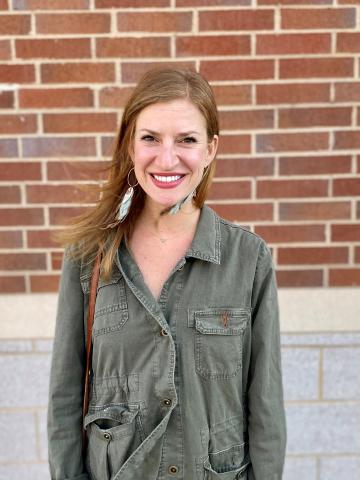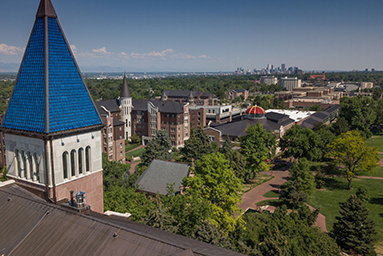Elizabeth Bogen
MAIDP
Minnesota native, Elizabeth Bogen (MA, LPC, RPT-S), came to Colorado in 2007 to attend the University of Colorado at Boulder where she studied psychology and minored in peace and conflict studies. Knowing she wanted to continue her education, Elizabeth applied and was accepted into the MAIDP program at the University of Denver Graduate School of Professional Psychology during her senior year at CU. Shortly after graduation, she transitioned into the IDP program at GSPP where she had a passion to work cross culturally and make a difference outside of her own “little bubble”. Working with kids and families was close to Elizabeth’s heart and while that audience wasn’t a major focus of the program at the time, she was able to select an internship experience that would facilitate working with this population. Her internship during second year at GSPP was with Judi’s House, a community based nonprofit bereavement center for children and families with the vision that no child should be alone in grief. Nine years later, she remains at Judi’s House, now as the Assistant Director of Clinical Training.
In her role at Judi’s House, Elizabeth acts as a grief counselor, among other things, - running grief and trauma informed groups - and owns a small caseload of non-group clients, mostly play therapy clients, as she is also a play therapist. After graduating from GSPP, Elizabeth sought out additional training to become play therapist certified through Regis University and other organizations. Part of overseeing the training program at Judi's House includes working closely with 5-7 graduate students, who come to gain experience and complete internship programs. She also gets to train and work with post-grads who are working toward licensure in the state of Colorado. Running and managing all aspects of the training program includes overseeing the training these individuals receive as well as being active in the community to provide training throughout Denver. Elizabeth’s responsibilities also resemble that of a clinical supervisor as well, allowing her to wear multiple hats in her role; “I never get bored!” she says.
In 2020, Elizabeth started her own private practice here in Denver called, Growing Hope Therapy, where she’s on a mission to support children, adolescents, young adults and their caregivers in growing their ability to cope and regulate the difficulties, struggles and traumas of life. She engages in other meaningful and community-focused work, collaborating with the Second Wind Fund, working with youth who are at risk for suicide, and the I Matter initiative through the State of Colorado, which provides three free counseling sessions for Colorado youth ages 21 or younger receiving special education services. Looking ahead, Elizabeth will move out of her role at Judi’s House and transition to focus on her private practice. In reflecting on the past year and a half, Elizabeth has witnessed “how the pandemic has especially impacted youth mental health across our community”. In her private practice, she carries a diverse caseload of ages, ranging from young kids to young adults, and tries to work with the whole person in mind.
Grief and Loss: Beyond Death
When it comes to grief, Elizabeth would like to remind us that it isn’t always about a death loss. “The pandemic has created so much grief in people’s lives; so many expectations weren’t able to be met over the last year and a half (due to the pandemic)”. This grief trend, a result of the pandemic, has been a big focus of her private practice work. Whether we recognize it or not, many of us have experienced a great deal of loss due to the pandemic ranging from the loss of normalcy, relationships, the celebration of life events, routines, and beyond.Elizabeth says, “Grief often comes from expectations; as humans, we like to make plans and build up expectations for different life events. The pandemic has resulted in people missing out on big life events that they were really looking forward to.” For children this can be especially difficult - when they’re no longer able to go socially engage at school or have a birthday party with all their friends. Experiencing death in the pandemic has been that much more burdensome as many have missed out on sharing grief with others, in a social sense. “When it comes to death loss, the pandemic has totally changed the way people are able to grieve. Grief tends to be very social – having celebrations of life or memorials services or simply being able to sit next to someone’s bedside as they’re sick has also been taken away from many people during the pandemic.”
Experiencing and Navigating Grief Over the Holidays
When reflecting on the Holiday season, Elizabeth shares that it can be a particularly hard time for many.“While it’s a time of joy and family in commercials and ads, people tend to feel a lot of loneliness when their experience doesn’t match what they see represented in society or on social media” she explains. If you’re experiencing grief, you may also be feeling sad, angry, or even jealous of other people in your life who haven’t or aren’t experiencing grief. Bogen shares that families at Judi’s House often communicate that the Holiday season is one of the hardest times of the year. “You go from one milestone to the next. – from Halloween, Thanksgiving, Christmas, New Years and on” she elaborates. “We call them grief waves at Judi’s House because grief is this total unpredictable, chaotic experience. We want it to be linear and we want it to make sense, so we use the metaphor of the ocean because it’s totally unpredictable and sometimes you can see a grief wave coming and you can prepare for it. Other times, a grief wave can hit you completely off guard, like when you’re in the ocean and you don’t see a wave coming.”
If you’re navigating this holiday season with grief on your heart, Elizabeth has some encouragement and recommendations for you. Setting boundaries is one of the biggest gifts you can give yourself. As people start asking a lot of you over the holidays, being prepared with some boundaries and a backup plan if those boundaries don’t go according to plan, can be invaluable to self-preservation. Additionally, if you are dealing with grief from a death, consider making time to memorialize, remember or honor that person over the holidays. Elizabeth says, “This could be looking at pictures, watching videos, or re-creating traditions. We often say at Judi’s House that ‘grief isn’t about letting go, it’s about holding on in a different way’”. Similarly, if you have expectations that haven’t been met or are dealing with a different type of grief, how can you release or change the way you hold onto those expectations? Consider re-framing expectations in your life around work, relationships, habits, and other things to move through this grief.
As she reflects on her time at GSPP and continues to work with graduate students from all over the state, Elizabeth says, “I have the honor of working with University partners from a variety of programs. However, I have a bias for the students that come out of GSPP because the quality of education, training and hands-on experience is so wonderful. I know how prepared GSPP students are before coming into the work force.” Throughout her time in the IDP program, Elizabeth enjoyed the strong balance between academics and field placements. Her summer field placement in Ghana working at a refugee camp and at a psychiatric hospital provided her with profound learning she couldn’t have replicated anywhere else.
Advice for Students and Professionals of All Ages
Elizabeth wants current students to embrace and “lean in to all your learning experiences.” To professionals and academics in any walk of life, “don’t be afraid to take the job that scares you or pushes you out of your comfort zone. Change is hard and challenge is hard, but when you actually put yourself out there, I think that’s where we learn and grow the most.” As Elizabeth enters a season of transition in 2022, she admits that she herself is embarking on this very journey! “I’m leaving a position that I’m very comfortable in – which is scary. One of the hardest things I’ve done is talk to my boss – who’s been a mentor and a friend of mine for 9 years – and tell her that I’m leaving because I just need a new challenge and want to continue to grow professionally.” Throughout our careers, there will be moments that challenge us, scare us and have the potential to change us. Like a muscle, the more we learn to handle and make decisions amid uncomfortable circumstances, we’ll get better at it!



